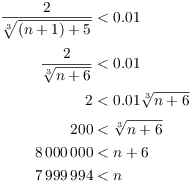Example. Does the series ![]() converge or diverge?
converge or diverge?
![]() is a
p-series with
is a
p-series with ![]() , so it converges.
, so it converges. ![]() is a geometric
series with
is a geometric
series with ![]() , so it diverges.
, so it diverges.
Hence, the sum of the two series diverges.![]()
Example. Determine whether the series converges or diverges. If it converges, find its sum.
![]()
The series is geometric with ratio ![]() , so it converges. The sum is
, so it converges. The sum is
![]()

Example. Does the series ![]() converge or diverge?
converge or diverge?
![]()
The series is geometric with ratio ![]() . Therefore, the series diverges.
. Therefore, the series diverges.![]()
Example. Does the series ![]() converge or diverge?
converge or diverge?
![]()
The series diverges by the Zero Limit Test.![]()
Example. Does the series ![]() converge or diverge?
converge or diverge?
![]() is a geometric sequence
with ratio
is a geometric sequence
with ratio ![]() , so
, so
![]() as
as ![]() . Therefore,
. Therefore,
![]()
Hence, the series diverges, by the Zero Limit Test.![]()
Example. Does the series ![]() converge or diverge?
converge or diverge?
The terms are positive. The function ![]() is continuous for
is continuous for ![]() . The derivative is
. The derivative is
![]()
I have ![]() for
for ![]() . Thus, the terms of the series decrease. The
hypotheses of the Integral Test are satisfied.
. Thus, the terms of the series decrease. The
hypotheses of the Integral Test are satisfied.
Compute the integral:
![]()
![]()
![]()
The integral converges, so the series converges, by the Integral
Test.![]()
Example. Does the series ![]() converge or diverge?
converge or diverge?
Notice that as ![]() ,
, ![]() decreases to 1. Thus,
decreases to 1. Thus,
![]()
![]() is
harmonic, so it diverges. Therefore, the original series diverges by
direct comparison.
is
harmonic, so it diverges. Therefore, the original series diverges by
direct comparison.![]()
Example. Does the series ![]() converge or diverge?
converge or diverge?
For large n, ![]() . Do a Limit Comparison:
. Do a Limit Comparison:

![]()
The limit is a finite positive number. ![]() diverges, because it's a p-series with
diverges, because it's a p-series with ![]() . Therefore, the original series
diverges, by Limit Comparison.
. Therefore, the original series
diverges, by Limit Comparison.![]()
Example. Does the series ![]() converge or diverge?
converge or diverge?
Apply the Ratio Test:

![]()
![]()
![]()
Therefore, the series converges by the Ratio Test.![]()
Example. Does the series ![]() converge or diverge?
converge or diverge?
Apply the Root Test:
![]()
The series converges by the Root Test.![]()
Example. The series ![]() converges by the Alternating Series Test.
converges by the Alternating Series Test.
Find the smallest value of n for which the partial sum ![]() approximates the actual value of the sum to within
0.01.
approximates the actual value of the sum to within
0.01.
The error in using ![]() to approximate the
actual value of the sum is less than the
to approximate the
actual value of the sum is less than the ![]() term in absolute value, so I want
term in absolute value, so I want

The smallest value of n is ![]() .
.![]()
Example. Does the series ![]() converge absolutely, converge conditionally, or
diverge?
converge absolutely, converge conditionally, or
diverge?
Consider the absolute value series ![]() .
By Limit Comparison,
.
By Limit Comparison,

The limit is a finite positive number. ![]() diverges,
because it's harmonic. Therefore,
diverges,
because it's harmonic. Therefore, ![]() diverges by Limit Comparison.
diverges by Limit Comparison.
Hence, ![]() does not converge absolutely.
does not converge absolutely.
Consider the original series ![]() . It alternates, and if
. It alternates, and if ![]() ,
,
![]()
Hence, the terms decrease in absolute value. Finally,
![]()
By the Alternating Series Test, ![]() converges. Since it converges, but does not converge
absolutely, it converges conditionally.
converges. Since it converges, but does not converge
absolutely, it converges conditionally.![]()
Copyright 2019 by Bruce Ikenaga